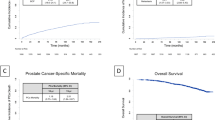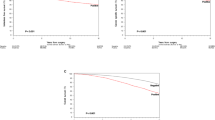Abstract
Detailed information is needed to understand the impact of biochemical failure (bF) on long-term outcome after definitive therapy for prostate cancer. In all, 223 consecutive men treated with radical retropubic prostatectomy were followed and long-term clinical outcome was investigated. Pathological examination revealed more locally advanced tumors in this study compared with the typical cohorts seen in the Western series. The Cox proportional hazards model indicates pretreatment prostate-specific antigen levels and risk group stratification to be a significant predictors for bF (P<0.05), but not for overall survival. Seminal vesicle involvement was a significant predictor of systemic progression, cancer death and overall survival (P<0.05). Positive surgical margin and bF were also found to be independent predictors of overall survival (P<0.05). In contrast to reports from Western countries, this study found a significant correlation between bF after radical prostatectomy and overall survival. This may reflect years-later detection of prostate cancer in Japan compared with Western series. Biochemical failure may ultimately be translated into decreased overall survival after sufficient follow-up.
This is a preview of subscription content, access via your institution
Access options
Subscribe to this journal
Receive 4 print issues and online access
$259.00 per year
only $64.75 per issue
Buy this article
- Purchase on Springer Link
- Instant access to full article PDF
Prices may be subject to local taxes which are calculated during checkout

Similar content being viewed by others
References
Pound CR et al. Natural history of progression after PSA elevation following radical prostatectomy. JAMA 1999; 281: 1591–1597.
Jhaveri FM, Zippe CD, Klein EA, Kupelian PA . Biochemical failure does not predict overall survival after radical prostatectomy for localized prostate cancer: 10-year results. Urology 1999; 54: 884–890.
Kupelian PA et al. Impact of biochemical failure on overall survival after radiation therapy for localized prostate cancer in the PSA era. Int J Radial Oncol Biol Phys 2002; 52: 704–711.
D'Amico AV et al. Pretreatment predictors of time to cancer specific death after prostate specific antigen failure. J Urol 2003; 169: 1320–1324.
Machida T et al. Clinical evaluation of a new kit (IMx PA Dainapack) for detection of serum prostate specific antigen. Acta Urol Japon 1993; 39: 977–984.
International Union against Cancer. TNM Atlas, 3rd edn., 2nd revision. Springer: New York 1992; pp 241–250.
UICC International Union. In: Sobin LH, Wittekind CH (eds). UICC International Union Against Cancer, TNM classification of malignant tumors. 6th edn. John Wiley & Sons, Inc: New York 2002; pp 184–187.
Egawa S et al. Infrequent involvement of the anterior base in low-risk patients with clinically localized prostate cancer and its possible significance in definitive radiation therapy. Jpn J Clin Oncol 2000; 30: 126–130.
Japanese Urological Association. General Rule for Clinical and Pathological Studies on Prostatic Cancer, 3rd edn. Japan: The Japanese Pathological Society 2001.
National Institute of Population and Social Security Research: Population Projections for Japan: 2001–2050 (with long-range population projects: 2051–2100).
Egawa S . Detection of prostate cancer by prostate-specific antigen. Biomed Pharmacother 2001; 55: 130–134.
Egawa S et al. Impact of life expectancy and tumor doubling time on the clinical significance of prostate cancer in Japan. Jpn J Clin Oncol 1997; 27: 394–400.
Partin AW, Oesterling JE . The clinical usefulness of prostate specific antigen: update 1994. J Urol 1994; 15: 1358–1368.
Zincke H et al. Long-term (15 years) results after radical prostatectomy for clinically localized (stage T2c or lower) prostate cancer. J Urol 1994; 152: 1850–1857.
Catalona WJ, Smith DS . Cancer recurrence and survival rates after anatomic radical retropubic prostatectomy for prostate cancer: intermediate-term results. J Urol 1998; 160: 2428–2434.
Gerber GS et al. Results of radical prostatectomy in men with clinically localized prostate cancer. JAMA 1996; 276: 615–619.
Hull GW et al. Cancer control with radical prostatectomy alone in 1000 consecutive patients. J Urol 2002; 167: 528–534.
Egawa S et al. Observations of prostate specific antigen doubling time in Japanese patients with nonmetastatic prostate carcinoma. Cancer 1999; 86: 463–469.
Bianco Jr FJ et al. Radical prostatectomy nomograms in black American men: accuracy and applicability. J Urol 2003; 170: 73–77.
Acknowledgements
We thank WA Thomasson, PhD, for expert editorial assistance.
Author information
Authors and Affiliations
Corresponding author
Additional information
Supported in part by a grant from the Ministry of Health and Welfare of Japan (11-10) and the Foundation for Promotion of Cancer Research in Japan.
Rights and permissions
About this article
Cite this article
Egawa, S., Matsui, Y., Matsumoto, K. et al. Impact of biochemical failure on long-term clinical outcome after radical prostatectomy for prostate cancer in Japan. Prostate Cancer Prostatic Dis 7, 152–157 (2004). https://doi.org/10.1038/sj.pcan.4500715
Received:
Revised:
Accepted:
Published:
Issue Date:
DOI: https://doi.org/10.1038/sj.pcan.4500715
Keywords
This article is cited by
-
Prostate-specific antigen adjusted for total prostatic tumor volume as a predictor for outcome after radical prostatectomy
Prostate Cancer and Prostatic Diseases (2007)



